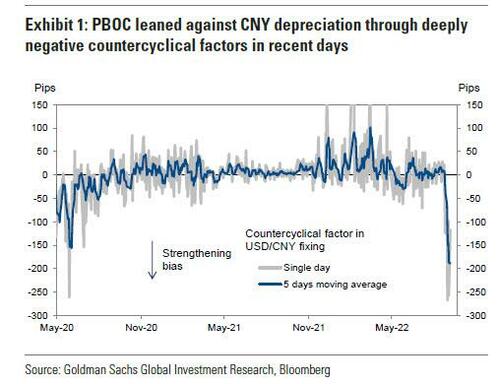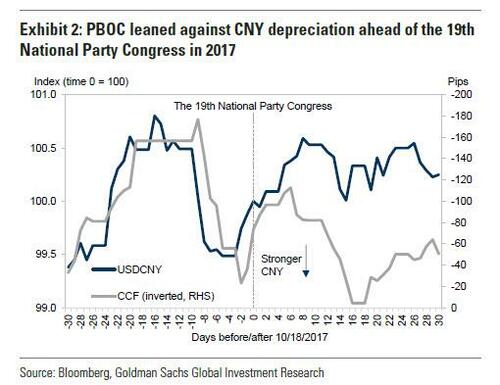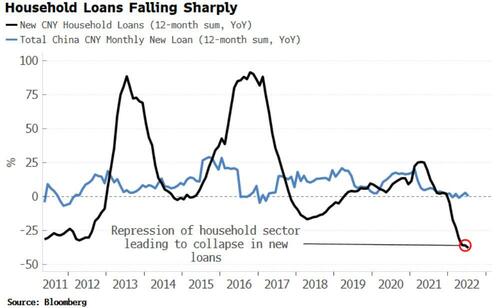“The EU Makes Its Peace With Economic War… And The Global Neoliberal System Is Collapsing Around Us”
By Michael Every of Rabobank
No role for payrolls, or G7 oil-price caps
For those paying not attention to war or peace, US payrolls coming in largely in line with consensus didn’t move markets much on Friday. Weak factory orders that followed did: but markets would have seized on shoelace futures for any excuse to tell themselves the Fed is going to back off on rate hikes – when it isn’t.
Then the G7 announced the imposition of an as-yet unspecified December price cap on Russia’s oil exports –and Russia turned off Nord Stream 1 gas flows– and markets tumbled. Stocks and bonds went down – but Brent oil went up before easing off highs.
The G7 proposal is that they can bring down the cost of energy by using its monopoly on oil tankers and insurance to force Moscow to sell oil at a lower price, choking off its export earnings and war budget to boot. This could work: unless Russia refuses to sell oil to anyone who imposes the price cap, which it will; or Western tankers refuse to comply, or make offshore ship-to-ship transfers; or Western insurers won’t play ball; or India and China start their own insurance schemes; or third parties buy the cheap oil, blend it, and sell it back to world markets at higher prices (and maybe even split the gains with Russia). Meanwhile, thousands of inspectors would be needed to (inefficiently) police it. In short, this G7 scheme plays at a ‘war economy’ rather than doing it for real, “because markets”, and oil prices are more likely to trend higher than lower against such a backdrop.
That is ironically also the backdrop for the OPEC+ meeting today, which energy markets will be looking to with anticipation: might we see cuts in output.
Meanwhile, European electricity prices could reportedly hit new highs this week, when the flood of problems already flowing from energy prices is already staggering: 6 out of 10 British manufacturers may go the wall; experts warn of energy rationing that could see Brits told not to cook until after 8pm, pubs close at 9pm, and three-day weeks at schools; aluminium smelters and steel mills are closing; fertilizer companies are shuttering; the Netherlands warns of a plunge in flowers, fruit, and vegetable output, with that of bricks also tumbling; Spanish output of ceramic tiles has halted; and a slew of Italian firms didn’t come back after the summer break. Regardless of gas storage levels for THIS winter, Europe faces an industrial supply-chain collapse – and just as it is has pledged to re-arm to face a worrying geopolitical future.
The EU makes its peace with economic war
As such, even though markets are still pricing for local and global commercial activity to continue as before, it is no surprise that the global neo-liberal market system is collapsing around us.
In the US, Trump-era tariffs on China were just extended; the White House is also considering dramatic restrictions on outward investment to China after its limits on semiconductor sales.
But that is far from all: after saying it will halt market mechanisms in energy last week, and German rolling out another EUR65bn in price subsidies over the weekend, the EU may be shifting towards a war economy.
As Reuters puts it: “The EU executive has been looking at how to avoid the supply bottlenecks that accompanied the coronavirus pandemic and no longer wants to rely on companies… to take precautions on their own. The so-called internal market emergency instrument, set to be presented on September 13, lays out several stages that open up varying powers to the Commission depending on the situation.” Via this new instrument the Commission will reportedly seek emergency powers giving it the right to re-organise supply chains; sequester corporate assets; re-write commercial contracts with suppliers and customers; order companies to stockpile strategic reserves; and force them to prioritise EU orders over exports. This is in effect a mirror of the ‘US Defence Production Act’ – and the current crisis suggests it is likely to be needed soon, and perhaps on a large scale. Colour me unsurprised if so, even if you have to colour markets red.
2016’s ‘Thin Ice’ showed how rapidly global neoliberalism would unravel based on heterodox economics, which shows neoliberalism’s Achilles’ heels, transition economics, which dissects how planned Soviet economies were turned into market economies, and realpolitik pointing to geopolitical rivalry as the trigger. The combination of the first two has been fabulously instructive, and predictive, in watching post-2008 market economies make the reverse journey, crisis by crisis, into crony socialism for the rich; the last matters too, as lots of people knew the neoliberalism wasn’t working –hence ‘lower for longer’– but couldn’t see how a left-wing policy backlash would happen. The answer was always that once we moved into the realm of national security, such populist policies would happen wrapped in the flag.
The way to fight economic war
The same framework can predict what now should logically follow.
Central bank will keep raising rates rise to deal with inflation – “No Escape From Biggest Bond Loss in Decades as Fed Keeps Hiking,” said Bloomberg this weekend. That said, some will be more willing than others to accept that fact: the Kiwi press, for example, is quoting RBNZ Governor Orr saying, “We’re not there yet, but we’re close,“ on a peak in rates, under the headline “Adrian Orr accepts mortgage rates could fall next year.” Really? Is that how you win an economic war?
Alongside higher rates, MMT will also need to back state spending in vital areas. Such hypothecated credit will reallocate scarce resources towards supply-chain restructuring and away from the likes of too-much high-end housing. Indeed, the question is when/if we also get non-fungible credit to key firms that can only go into specific physical capital rather than being arbitraged. It might take a central bank digital currency to do it, but it will happen: you don’t win wars with SPVs and spivs.
MMT will probably also be used to supress energy prices to maintain as much industrial supply as possible, and to minimize household pain. In which case, we will have to see the Commission’s proposed industrial policy too: because if we do not have energy rationing by price, which the Soviets avoided, then we will have it by diktat, as the Soviets then had to do. And note the Soviets only avoided a currency collapse with capital controls and fixed exchange rates.
We will also require friendshoring or onshoring to recycle capital and keep production in ‘safe’ hands. It’s time for market analysts to stop looking at papers on the benefits of free trade, and to instead read academic papers from other disciplines, such as ‘Wartime Commercial Policy and Trade between Enemies’ (Grinberg, 2021), which assesses how trade works during wars. Grinberg shows there are rare examples of countries selling weapons to their enemies: in the Siege of Grave, the French commander was ordered to sell gunpowder to the Dutch forces besieging his town. There is evidence for business-as-usual non-military trade despite bloodshed in smaller wars: during the Crimean War (1853-56), flax, hemp, linseed, and tallow trade continued between the UK and Russia given no alternative buyers or sellers. Even early in WW1, UK-German trade-flows were so large that they were allowed to continue either directly or via third parties.
However, the key conclusion is the more a war is seen as existential and/or long term, the more trade is disrupted, whatever the costs – and business lobbying has little effect on such national security decisions.
It’s existential to get this call right
It goes without saying this war is existential for Ukraine; and Russia says it is for it too. The above hypothesis suggests the Commission’s latest policy proposals say the war is also existential and/or long-term for Europe. By contrast, the G7’s laughable oil-price cap says Ukraine is a far less important, shorter term struggle. Either that, or it reflects the ‘Crimean’ reality that there is no alternative oil seller or buyer. In which case, no, not just back to “because markets”…. the Commission’s proposals for rationing by diktat and industrial policy are going to be needed even more, as shown above.
The alternative policy call stemming from the populist right and left –even from heterodox voices who predicted this neoliberal collapse, such as the brilliant Steve ‘MMT’ Keen– is to say ‘give Putin Ukraine to get cheap gas’. However, this is a simplistic “because not markets” view which fails to see the logical and historical risks that a Western retreat could open the door for more, and more global, war; for more, and more global weaponization of commodities and trade; and, though nobody in the West will publicly admit it, for a huge tail risk to the living standards it (fairly or unfairly) enjoys.
In short, this war clearly remains both existential and long-term: and Grinberg’s hypothesis, and my own ‘Thin Ice’ framework, say commercial activity will shift accordingly. Indeed, if the Commission crosses the looming policy Rubicon, the EU may not be able to go back to ‘normal’ until its economy has been restructured defensively – literally so; and until geopolitical risks have been resolved by said defensive actions; and that might take years, or even *decades*.
Markets will have to make their peace with the reality of economic war: more state controls on what you can and can’t do; rationing by price or by diktat; MMT; perhaps non-fungible credit; higher structural inflation; higher interest rates; mercantilism in ideological blocs; and a broad reversal of globalisation’s trend of higher asset prices and lower goods prices.
You have not seen what Ga-Liz-riel has seen
Against this backdrop, Ga-Liz-riel Truss is likely to be selected as the new UK PM today and assume office tomorrow – to face perhaps 20% inflation, strikes, recession, shortages, blackouts, ‘economic’ war with Russia, and possible trade war with the EU over Northern Ireland.
Her philosophy of “geoliberalism” makes her a foreign policy leader in shining armor with blade out for Russia and China. Yet her Brexit self-confidence may also see her dive into the sea to swim away from allies in Europe and the West, ending up on a raft. Further, while absolutely cognizant of the ongoing economic war, having called for the G7 to become an “economic NATO”, and backing a new global “Network of Liberty”, her domestic policy is hard to reconcile with it.
Truss is adamantly backing tax cuts for high earners and businesses, despite all the evidence that this is the worst possible way to run MMT or boost the supply-side; and she may also introduce Covid-scale price subsidies to keep energy lower. If so, that is a belt and braces, and sword and shield and plate-mail armour, approach that will artificially suppress supply shocks while juicing demand, and yet doing nothing to restructure supply chains defensively, or to reallocate physically scarce resources. Nobody wins an economic war that way.
Apparently, however, we should all expect confident Ga-Liz-riel statements that: “You have not seen what I have seen.” Like the 1970’s collapse in Sterling, where the IMF had to be called in?
Tyler Durden
Mon, 09/05/2022 – 15:10
via ZeroHedge News https://ift.tt/XwjPZLM Tyler Durden








